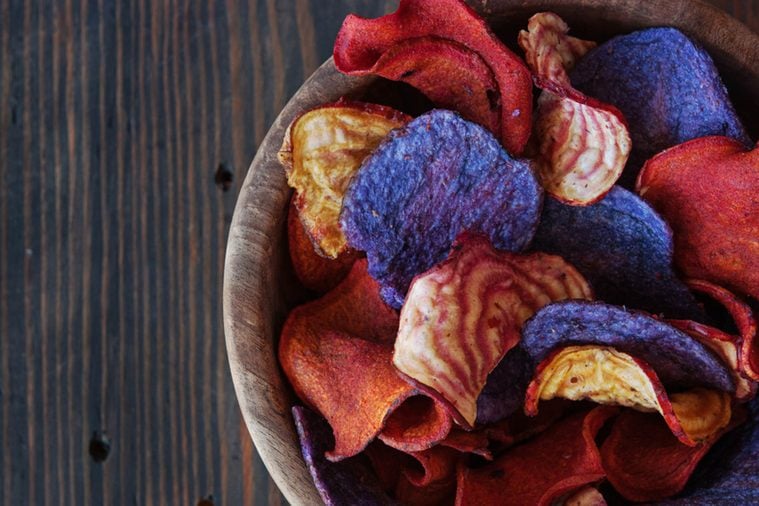Why You Should Stop Eating Vegetable Chips ASAP
Updated: Jul. 06, 2017
Might as well go back to your Lay's habit.

You know you need to eat more vegetables, so veggie chips seem like the savior you’ve been looking for. After all, with their addictive, salty crunch, it’s easy to demolish a whole bag and still feel good about yourself. Such a healthy snack seems too good to be true—because it is.
Registered nutritionist Charlotte Stirling-Reed paired with kitchen retailer Wren Kitchens to take a look at the facts behind vegetable chips’ health halo. Her analysis found veggie chips aren’t any better than potato chips. In fact, they could be worse.
You might think you’re chowing down on pure produce, but a bag of vegetable chips might actually be only 65 percent vegetables. The rest is just oil and salt.
“The concern with products that are often seen as ‘healthier alternatives,’ such as vegetable crisps, is they don’t always match up to their reputations,” Stirling-Reed says in a statement. (Don’t miss these other common healthy eating mistakes.)
For instance, Tyrells Veg Chips are cooked with sunflower oil. That might sound natural and healthy, but it’s actually really common in processed food—including Lay’s. “Sunflower seed oil is commonly used in frying, fast-food prep and packaged and processed foods,” registered holistic nutritionist Yuri Elkaim writes for U.S. News. “It is so prevalent I can almost guarantee you that if a food comes in a package, you’ll find sunflower seed oil in the ingredient list. And this is not a good thing.”
Sunflower oil is high in omega-6 acids. Our bodies do need some of those fatty acids, but most people go way overboard. Studies have linked too many omega-6s (and not enough omega-3 fatty acids) with obesity, cardiovascular disease, Alzheimer’s, and more. A serving of Tyrrells veg chips has 150 calories and 11 grams of fat—shockingly close to a serving of classic Lay’s, which have 160 calories and 10 grams of fat.
Plus, the two clock in with the same amount of sodium: 170 milligrams. A high-salt diet can lead to high blood pressure, heart disease, kidney problems, and more. Doesn’t seem so nutritious anymore, does it?
Veggie chips are particularly dangerous because people tend to think the “healthy” snack is a free-for-all. Thinking of potato chips as a guilty pleasure, you might hold back a bit. But when it comes to “eating clean” with veggie chips, you gobble down half the bag without thinking twice.
“There is a danger that people may consume more of a product if they consider it to be ‘healthier,’” says Stirling-Reed. “As a nutritionist, I’ve seen this firsthand in weight loss clinics where clients may eat even as much as double a portion size of a product if it’s perceived to be healthy.” Double the portion means double the fat and salt you’d have eaten if you’d just stuck with the Lay’s.
Ideally, you should swap out the processed snacks for fresh fruits and vegetables, yogurt, or nuts, says Stirling-Reed. If only chips will quash your craving, make your own at home, she says. That way, you’re in charge of how much (or little!) oil goes in, and you can get your flavor from spices instead of salt. Start with one of these homemade baked chip recipes.